
What is Godot?
You guessed it! Godot is an open-source game engine. Next question.
Just kidding. Godot appeared for the first time in 2014, and it quickly gained popularity among indie developers due to its ease of use and free licensing, among other things.
While initially optimized for 2D, since V3, its 3D capabilities have increased exponentially -now Godot is a popular alternative to develop for Switch- to the point of being today the third most used engine worldwide (and the first open source).
So, without further ado, let's break down why you should take a look at Godot.
Entry Point
As a person whose first approach to game development was to learn Unity with basically no programming experience -I wouldn't recommend this path to anyone- I really wanted to bang my head against the wall when I got to know Godot. Unity is, of course, an awesome tool and probably the most versatile engine around, but its learning curve is freaking steep.
Godot’s balance, on the other hand, between its powerfulness and ease of use, might be the best one there is. If you are new to programming or game development, especially if you already tried some more limited and easy tools like Construct or Twine, Godot is definitely the next place to go. Even if you eventually want to go to Unreal or Unity terrain, your journey will be so much more pleasant and stress-free getting into Godot first.
GD Script
Godot’s primary programming language is GDScript, an object-oriented language specifically designed for Godot. It offers an intuitive experience to game developers that is very similar to Python, which makes it very approachable for beginners.
The engine also has C# and C++ support (actually sponsored by Microsoft itself) as well as visual scripting for those with a more visual approach to learning.
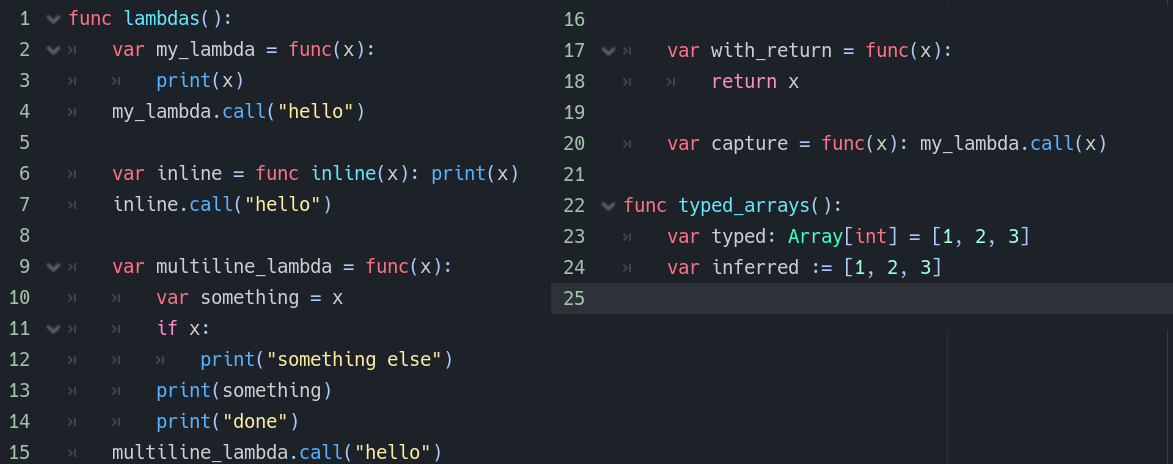
Interface
Godot’s interface is designed to be intuitive, flexible, and customizable. Its user-friendly interface proves useful for both beginners and seasoned developers while remaining similar to other engines' interfaces.
The script editor is embedded in the engine’s interface with syntax highlighting, auto-completion, and built-in debugging tools, as well as the ability to simply drag and drop objects from the scene to get references in code.
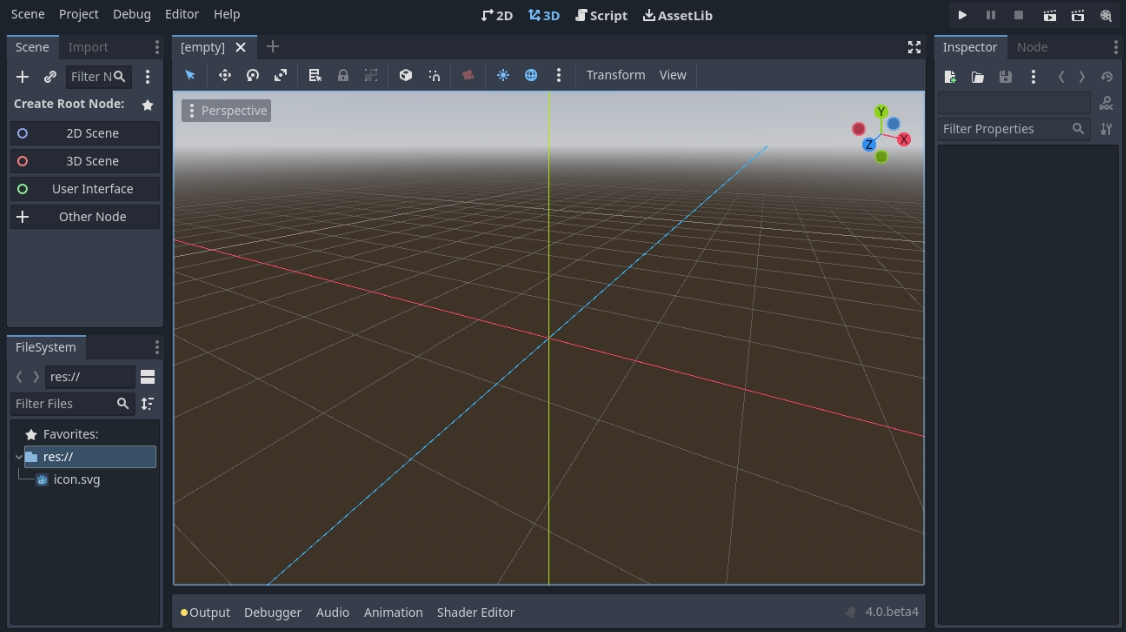
Overall Accessibility
Godot is not only accessible in terms of its ease of use and learning curve but also its hardware requirements, which makes it appealing not only to indie developers and hobbyists but also especially to students who usually don't have high-performance hardware in their educational facilities. The engine itself has a weight below the 100MB (!!) mark and doesn't require installation whatsoever. Godot's minimal system specifications make it usable on almost any machine. For 2D game development, even a modest laptop or desktop with an integrated graphics card and 2 GB of RAM is often enough. For 3D projects, a system with a slightly better GPU and around 4 GB of RAM is recommended, though it still doesn’t demand high-end specs. This flexibility makes Godot a practical choice for developers without access to specialized or costly hardware, broadening its accessibility to a wider range of users.
Challenges and Limitations
So why isn’t the whole world up on Godot’s train right now? Of course, for all the good that it has, there are still a lot of limitations and weaknesses. As with everything in Gamedev, there’s not an ultimate solution for every project; there are different technologies that better fit each individual case. Godot’s limitations primarily affect high-performance 3D games and projects requiring extensive third-party tools or marketplace assets. However, the engine’s strengths in 2D development, low system requirements, ease of use, and open-source flexibility make it a powerful tool for indie developers. Many of its current challenges are actively being addressed by the Godot team, showing that while Godot may not yet match the capabilities of larger engines in all areas, it continues to evolve to meet the needs of its growing community.
Although Godot has made significant strides in 3D development (like including the Vulkan renderer in Godot 4), it still lags behind engines like Unreal and Unity in terms of advanced 3D rendering, photorealistic graphics, and high-performance optimization. Complex visual effects, high-fidelity lighting, and advanced shaders are possible in Godot but can be more challenging to implement or less efficient than in mainstream engines.
Assets Store and Third-Party Integrations
Godot lacks a centralized asset marketplace akin to Unity's Asset Store or Unreal’s Marketplace, which offers a vast selection of pre-made assets, tools, and plugins. While there are growing third-party sites and community resources for Godot assets, they are not as extensive or integrated. Indie developers may have to create more assets from scratch or rely on smaller, community-driven repositories, which can slow down development. However, the open-source community around Godot is active, and there are ongoing efforts to create alternative asset libraries.
Console Support
Godot’s support for console platforms (e.g., PlayStation, Xbox, and Nintendo Switch) is still limited and not as streamlined as Unity’s or Unreal’s. Official support for these platforms requires a third-party provider and specific licensing, which can add additional costs.
Godot’s Community
Godot’s community is one of its greatest assets, characterized by openness, collaboration, and a strong DIY ethic that comes from its open-source roots. Since Godot is free and open-source, the community actively contributes to its development, creating a highly collaborative and welcoming atmosphere. The community is also global, with contributors, users, and fans from around the world who share a passion for making game development accessible to everyone.
The community constantly produces tutorials, assets, plugins, and other resources to help fellow developers. Websites like Godot Asset Library and unofficial communities such as Godot Engine Q&A and various GitHub repositories provide users with free assets, scripts, and tools. Since Godot does not have a central asset marketplace, the community’s contributions are invaluable for new and experienced developers alike.
The Godot community organizes regular events, such as game jams (e.g., the Godot Wild Jam) and conferences, where developers can showcase their projects, learn from each other, and network. Many local user groups have also formed, allowing Godot developers to connect in person, discuss projects, and collaborate.
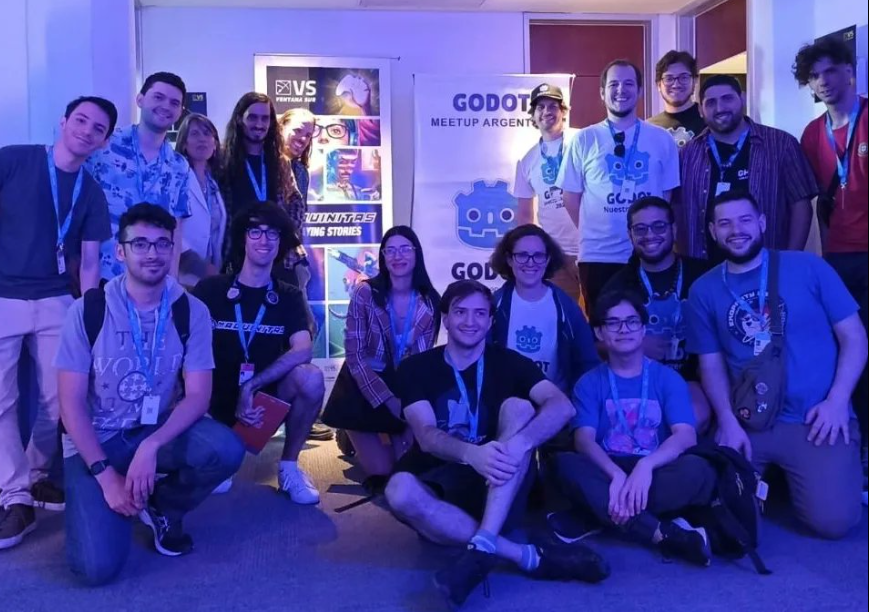
The Future of Indie (and Not So Indie) Development
Godot’s usage has grown exponentially in recent years. Events like last year’s Unity pricing policy update resulted in a massive exodus, mainly towards Godot. While Unity stepped back from that decision recently, many developers saw that the realities of a public company are not going to change, and they might encounter new surprises like that while keeping their projects on those platforms.
Here’s a side-by-side comparison of the engine usage in the Game Maker’s Toolkit Game Jam (one of the jams that draw more participants in the world), editions 2020 and 2024.
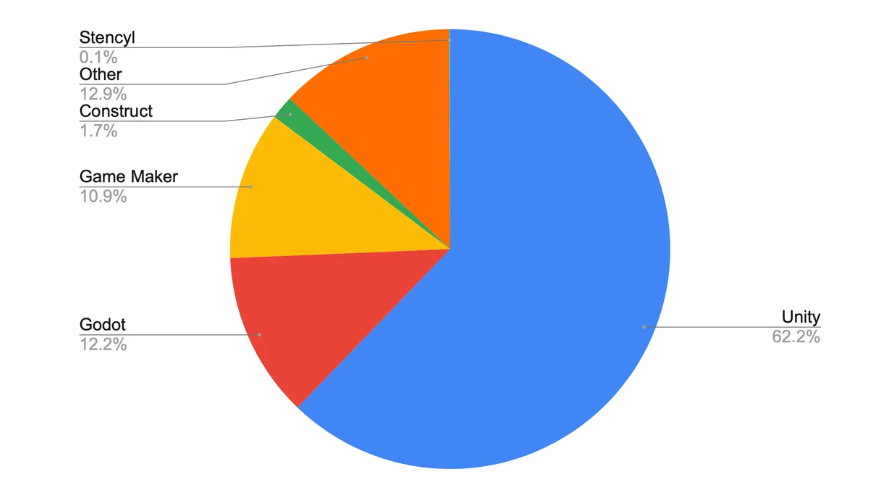
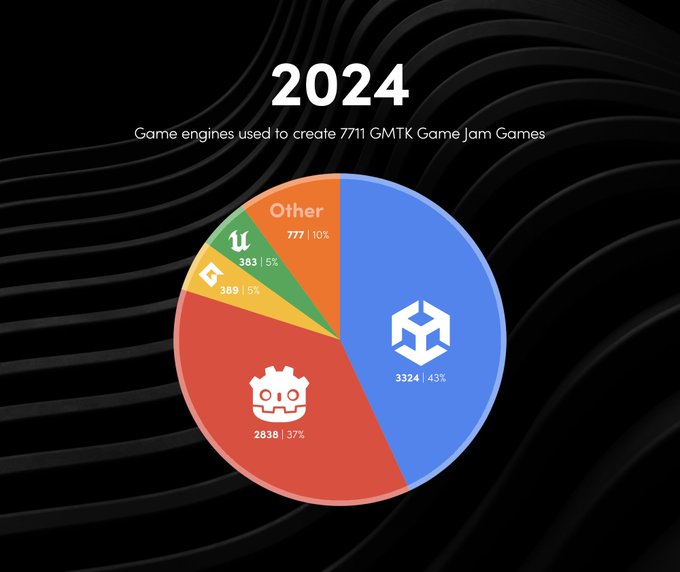
Use Cases and Success Stories
Godot has seen increasing adoption by indie developers and studios on both 2D and 3D games. Here are some examples of successful and critically acclaimed games created with the engine (you can also check out Godot’s showcase here):
The Garden Path (Nintendo Switch, Steam)
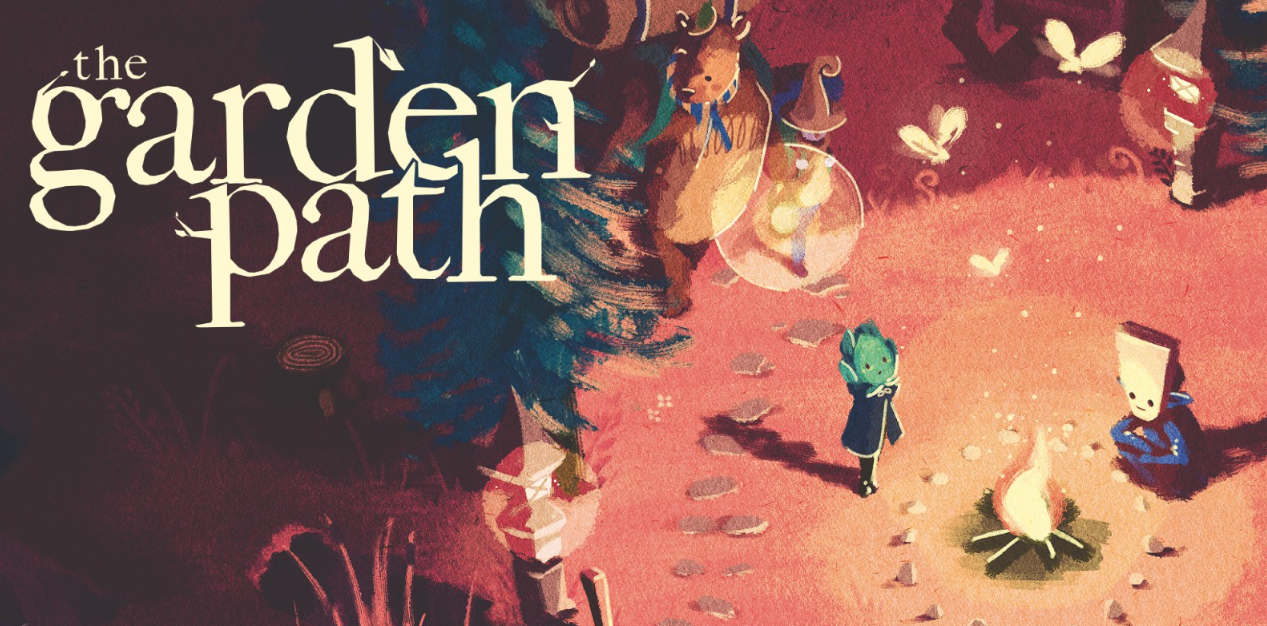
The Garden Path is a relaxing getaway where you can discover a secret garden and your role within it. A slice-of-life gardening sim that celebrates small moments. No matter how you decide to play, the garden is a tender world of familiar sights and sounds, mysteries, and friendly faces. A space to call your own, to curate, and to reflect.
With its stunning watercolor-like visuals and local coop mode, The Garden Path offers a cozy and heartwarming experience.
TailQuest Defense (Steam, GOG)
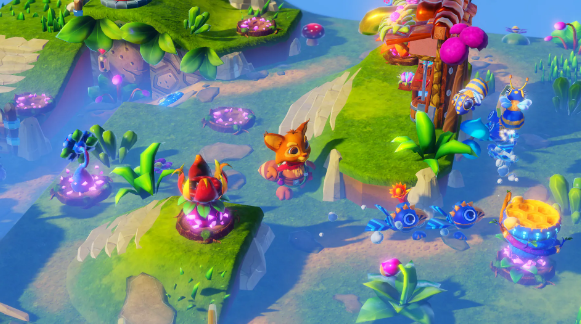
An action-packed tower defense game where you have to stop invaders by placing towers at strategic points around colorful landscapes. Its tower defense mechanics mix up with puzzle platformer parts in an experience full of colorful and vivid graphics. With local coop play, TailQuest Defense is apt for both casual and hardcore audiences.
Brotato (Steam, PS4, PS5, Xbox One, Xbox Series, Nintendo Switch)
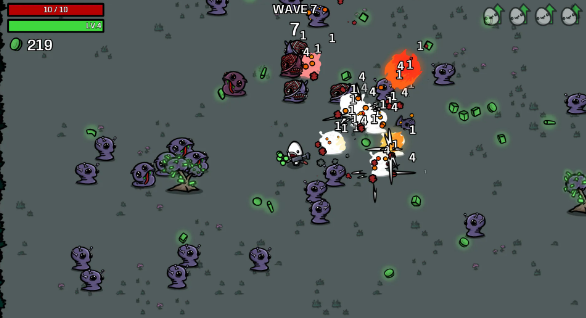
Brotato is a top-down arena bullet hell shooter roguelite where you play a potato. Need any more details than that? Dozens of characters available to customize your runs, hundreds of items and weapons to choose from and a whole bunch of accessibility options make Brotato a rich experience you can play on basically any platform out right now.
Cruelty Squad (Steam)
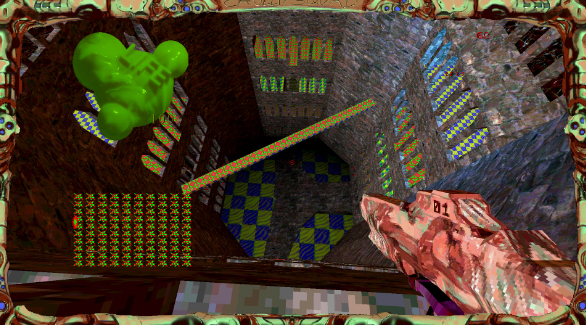
With the first-person shooter Cruelty Squad’s trippy 3D style, we can see once again that Godot is an engine fit for basically any game genre and visual style. This tactical FPS is set in the hardcore gig economy of corporate liquidations. It offers multiple viable approaches and routes to complete each mission, fighting and sneaking through offices, suburbs, police stations, and secret compounds.
Conclusion
In conclusion, Godot has proven itself to be a powerful, flexible, and accessible game engine, making it a viable alternative to mainstream engines like Unity and Unreal. Its open-source nature grants developers unparalleled freedom to customize and adapt the engine to their specific needs without licensing costs or usage restrictions. With a focus on a node-based scene architecture and an easy-to-learn scripting language, GDScript, Godot is especially beginner-friendly yet still offers the sophistication needed for complex projects. This versatility has enabled a wide variety of developers— from solo indie creators to small studios—to produce highly polished, engaging games across 2D, 3D, and mobile platforms.
The Godot community continues to grow rapidly, fostering a rich ecosystem of resources, tutorials, and contributions that support new users and experienced developers alike. Regular updates by the core development team and community contributions help Godot remain competitive in an evolving industry. Whether creating a simple 2D platformer, an intricate visual novel, or a unique experimental project, Godot’s capabilities make it an exciting and valuable tool in the world of game development.


.avif)
